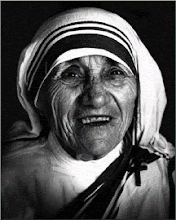Analyzing her deeds and achievements, John Paul II asked: "Where did Mother Teresa find the strength and perseverance to place herself completely at the service of others? She found it in prayer and in the silent contemplation of Jesus Christ, his Holy Face, his Sacred Heart."[56]
In his first encyclical Deus Caritas Est, Benedict XVI mentioned Teresa of Calcutta three times and he also used her life to clarify one of his main points of the encyclical. "In the example of Blessed Teresa of Calcutta we have a clear illustration of the fact that time devoted to God in prayer not only does not detract from effective and loving service to our neighbour but is in fact the inexhaustible source of that service."[57] Mother Teresa specified that "It is only by mental prayer and spiritual reading that we can cultivate the gift of prayer."[58]
Although there was no direct connection between Mother Teresa's order and the Franciscan orders, she was known as a great admirer of St. Francis of Assisi.[59] Accordingly, her influence and life show influences of Franciscan spirituality. The Sisters of Charity recite the peace prayer of St. Francis every morning during thanksgiving after Communion and many of the vows and emphasis of her ministry are similar.[59] St. Francis emphasized poverty, chastity, obedience and submission to Christ. He also devoted much of his own life to service of the poor, especially lepers in the area where he lived.
Mother Teresa wrote numerous letters to her confessors and superiors over a 66-year period. She had asked that her letters be destroyed, concerned that "people will think more of me -- less of Jesus."[60] However, despite this request, the correspondences have been compiled in Mother Teresa: Come Be My Light (Doubleday).[61][45] In one publicly released letter to a spiritual confidant, the Rev. Michael van der Peet, she wrote, "Jesus has a very special love for you. [But] as for me, the silence and the emptiness is so great, that I look and do not see, — Listen and do not hear — the tongue moves [in prayer] but does not speak ... I want you to pray for me — that I let Him have [a] free hand."
Many news outlets have referred to Mother Teresa's writings as an indication of a "crisis of faith." [62] However, others such as Brian Kolodiejchuk, Come Be My Light's editor, draw comparisons to the 16th century mystic St. John of the Cross, who coined the term the "dark night" of the soul to describe a particular stage in the growth of some spiritual masters.[45] The Vatican has indicated that the letters would not affect her path to sainthood. [63] In fact, the book is edited by the Rev. Brian Kolodiejchuk, her postulator, the official responsible for gathering the evidence for her sanctification.[45]

1 comment:
Thanks for sharing them.This article is very useful.This contain more information about Mother Teresa.I would like to read Mother Teresa Quotes
Post a Comment